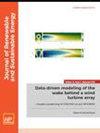基于多博弈的数据中心优化调度
IF 1.9
4区 工程技术
Q4 ENERGY & FUELS
引用次数: 0
摘要
随着电力零售商在电力市场中的主导地位日益增强,数据中心(DC)参与销售侧交易已成为一种新的趋势。然而,作为不同的利益相关者,数据中心电力零售商(dcer)和由dcer购买电力的数据中心将不可避免地面临利益冲突。为促进数据中心与数据中心的利益分配,实现双赢,本研究提出了一种基于多博弈的最优调度方法,并将主从博弈方法与合作博弈方法相结合,建立了以数据中心以利润最大化为优化目标,互联网数据中心以总成本最低为优化目标的混合博弈模型。DCER与DC之间采用主从博弈,DC成员之间采用合作博弈。利益是通过纳什议价分配的。采用粒子群优化算法结合乘法器交替方向法对模型进行求解。为了证明我们提出的方法的有效性,我们提供了一个说明性的例子,展示了它不仅能增加DCER收入136.04%,而且能降低总DC成本9.39%。因此,我们的方法有助于更公平地分配合作收入。本文章由计算机程序翻译,如有差异,请以英文原文为准。
Optimal scheduling of data centers based on multiple games
With the increasing dominance of electricity retailers in the electricity market, it has become a new trend for the data center (DC) to participate in sales-side transactions. However, data center electricity retailers (DCERs) and DCs that purchase electricity by DCERs, as different stakeholders, will inevitably face conflicts of interest. To promote the benefit distribution of DCs and DCERs to achieve a win–win situation, our study proposes an optimal scheduling method based on multiple games and establishes a mixed game model by integrating the master–slave game method and the cooperative game method, in which DCERs take profit maximization as the optimization goal, while Internet DCs take the lowest total cost as the optimization goal. The master–slave game is adopted between the DCER and the DC, and the cooperative game is adopted among the members of the DC. The benefits are distributed through Nash bargaining. The model is solved by using the particle swarm optimization algorithm combined with the alternating direction method of multipliers. To demonstrate the effectiveness of our proposed method, we provide an illustrative example that showcases its ability to not only increase DCER revenue by 136.04% but also decrease total DC costs by 9.39%. As a result, our method facilitates a more equitable distribution of cooperation revenues.
求助全文
通过发布文献求助,成功后即可免费获取论文全文。
去求助
来源期刊

Journal of Renewable and Sustainable Energy
ENERGY & FUELS-ENERGY & FUELS
CiteScore
4.30
自引率
12.00%
发文量
122
审稿时长
4.2 months
期刊介绍:
The Journal of Renewable and Sustainable Energy (JRSE) is an interdisciplinary, peer-reviewed journal covering all areas of renewable and sustainable energy relevant to the physical science and engineering communities. The interdisciplinary approach of the publication ensures that the editors draw from researchers worldwide in a diverse range of fields.
Topics covered include:
Renewable energy economics and policy
Renewable energy resource assessment
Solar energy: photovoltaics, solar thermal energy, solar energy for fuels
Wind energy: wind farms, rotors and blades, on- and offshore wind conditions, aerodynamics, fluid dynamics
Bioenergy: biofuels, biomass conversion, artificial photosynthesis
Distributed energy generation: rooftop PV, distributed fuel cells, distributed wind, micro-hydrogen power generation
Power distribution & systems modeling: power electronics and controls, smart grid
Energy efficient buildings: smart windows, PV, wind, power management
Energy conversion: flexoelectric, piezoelectric, thermoelectric, other technologies
Energy storage: batteries, supercapacitors, hydrogen storage, other fuels
Fuel cells: proton exchange membrane cells, solid oxide cells, hybrid fuel cells, other
Marine and hydroelectric energy: dams, tides, waves, other
Transportation: alternative vehicle technologies, plug-in technologies, other
Geothermal energy
 求助内容:
求助内容: 应助结果提醒方式:
应助结果提醒方式:


